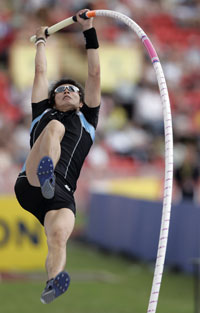New technologies for sport equipment
[ 2006-12-21 14:52 ]

撐桿最初是用緊密木材——可能是山胡桃樹做成的,1896年雅典奧運(yùn)會(huì)上,有人用竹子撐桿創(chuàng)造了10英尺6英寸的記錄。1942到1957年間,嘗試了鋁質(zhì)、鋼質(zhì)以及玻璃纖維的撐桿,最后以玻璃纖維的勝出而告終。
Pole Vault: Poles were originally made out of solid wood,
probably hickory. At the 1896 Olympics in Athens, a bamboo pole was used to set
the vaulting record of 10 feet 6 inches. Between 1942 and 1957, aluminum, steel,
and fiberglass poles were tried. Fiberglass won out, increasing the indoor
record height to 20 feet 2 inches in 1993.
1948年倫敦奧運(yùn)會(huì)上木質(zhì)的起跑架代替了腳趾槽。在古希臘,跑步選手以立姿起跑,如果起跑過早會(huì)遭鞭打。而現(xiàn)代金屬起跑架內(nèi)置了微型控制器,防止運(yùn)動(dòng)員起跑過早。
Sprint:
Wooden starting blocks replaced toe grooves at the 1948 London games. In ancient
Greece, runners took off from a standing position and were flogged if they
started too soon. Modern metal starting blocks contain micro-controllers to
prevent false starts.

1972年奧運(yùn)會(huì)馬拉松賽的美國預(yù)選賽中運(yùn)動(dòng)員穿的楔形后跟的跑鞋開創(chuàng)了現(xiàn)代跑鞋的新紀(jì)元。
Marathon:
wedge-heeled Nike sneakers at 1972 US Olympic trials began the modern
running-shoe
ear.
公元前500年使用的細(xì)長的木質(zhì)標(biāo)槍中間纏有一層繩索,在投擲標(biāo)槍時(shí),運(yùn)動(dòng)員須抓住繩索的一端讓標(biāo)槍在空中自由旋轉(zhuǎn),這種旋轉(zhuǎn)可以使標(biāo)槍更穩(wěn)。1908年奧運(yùn)會(huì)上投擲最遠(yuǎn)的有50米,1976年增加到95米,1984年尤韋·洪在一次比賽中投出了104.80米的驚人成績(jī)。國際業(yè)余田徑聯(lián)合會(huì)很快決定重新設(shè)計(jì)標(biāo)槍,來限制其投擲距離。修改之后的標(biāo)槍重心往前移動(dòng)了4厘米,此時(shí)標(biāo)槍能投擲的距離比修改前縮短了15米。
Javelin:
The javelin was an event first enjoyed by the Mycenaeans at least 3000 year ago.
The Greeks of 500 BC used thin wooden javelins with a cord wrapped around the
centre of mass. When the javelin was thrown, the athlete would hold onto the end
of the cord to make the javelin rotate freely through the air in much the same
way that a toy gyroscope is made to rotate by pulling a string. The rotation
stabilized the javelin by averaging any asymmetries in its construction about a
central axis. At the London games in 1908 the winning throw was just over 50m.
By 1976 this distance had increased to almost 95m and in non-Olympic event. The
IAAF decided fairly quickly that the javelin had to be redesigned to
underperform. According to Mont Hubbard of the University of California at
Davis, the furthest distance a javelin could be thrown depended on how it was
designed. When the rules were changed so that the centre of mass was moved 4cm
forward, the total distance a javelin can travel is reduced 15m than they were
before the rule change.
(Foreign and Domestic Olympic
Stories) |